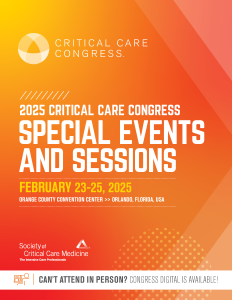Back
Behavioral Health & Well-Being
Research Snapshot Theater: Behavioral Health and Well-Being, Adult and Pediatric
(120) Dine and Dash: Improving Morale in Pediatric Intensive Care Providers
Sunday, February 23, 2025
11:00am – 12:00pm Eastern Time
Location: Connections Central - RST 02


Andrea R. Maxwell, MD, MPH (she/her/hers)
Medical College of Wisconsin
Medical College of Wisconsin, Wisconsin, United States
First Author(s)
Co-Author(s)
Introduction: Burnout was defined by Maslach, et al. as a psychological syndrome due to stressors on the job with key characteristics including exhaustion, cynicism, and detachment. Recent work has shown that these burnout qualities have been associated with impaired quality of care including increased total length of stay, readmits, and medical errors. With exposure to stressful situations and high patient load, critical care providers are more susceptible to experiencing burnout. Strategies such as cultivating social support have been proposed to combat burnout. We aimed to improve morale and social/team bonding through a low-cost wellness intervention.
Methods: Through a wellness grant, a monthly “family dinner” was sponsored for pediatric critical care healthcare providers on call from January 2024 to current date. Providers served included residents, fellows, advanced practice practitioners (APPs), and attendings. Icebreakers were provided for participants at the dinner. After attending, participants were asked to complete a short survey asking about their experience with the “family dinner,” with questions surrounding team bonding.
Results: These “family dinners” served 36 unique critical care providers. The survey had 29 responses from January 2024 to current date from 12 fellows, 11 faculty, 3 residents, and 3 APPs. Preliminary results show that 90% (26/29) of respondents strongly agreed that family dinners made them feel more connected to their colleagues, with most (28/29) agreeing that they learned something about at least one of their colleagues. Many participants (86%, 25/29) strongly agreed that family dinners allowed some time to recharge. Comments included: “it was nice to have [icebreakers] as conversation starts to learn more about your colleagues without the uncomfortableness of coming up with questions to ask yourself,” and “it allowed us a little reprieve which I think really helped us maintain elevated spirits the rest of the evening.”
Conclusions: In preliminary results, family dinners improved team bonding and morale among pediatric critical care providers on call. Comments supported quantitative findings with an improved connection to colleagues and a reprieve from exhaustion. Overall, this was an effective, low-cost intervention to improve unit wellness among providers.
Methods: Through a wellness grant, a monthly “family dinner” was sponsored for pediatric critical care healthcare providers on call from January 2024 to current date. Providers served included residents, fellows, advanced practice practitioners (APPs), and attendings. Icebreakers were provided for participants at the dinner. After attending, participants were asked to complete a short survey asking about their experience with the “family dinner,” with questions surrounding team bonding.
Results: These “family dinners” served 36 unique critical care providers. The survey had 29 responses from January 2024 to current date from 12 fellows, 11 faculty, 3 residents, and 3 APPs. Preliminary results show that 90% (26/29) of respondents strongly agreed that family dinners made them feel more connected to their colleagues, with most (28/29) agreeing that they learned something about at least one of their colleagues. Many participants (86%, 25/29) strongly agreed that family dinners allowed some time to recharge. Comments included: “it was nice to have [icebreakers] as conversation starts to learn more about your colleagues without the uncomfortableness of coming up with questions to ask yourself,” and “it allowed us a little reprieve which I think really helped us maintain elevated spirits the rest of the evening.”
Conclusions: In preliminary results, family dinners improved team bonding and morale among pediatric critical care providers on call. Comments supported quantitative findings with an improved connection to colleagues and a reprieve from exhaustion. Overall, this was an effective, low-cost intervention to improve unit wellness among providers.

